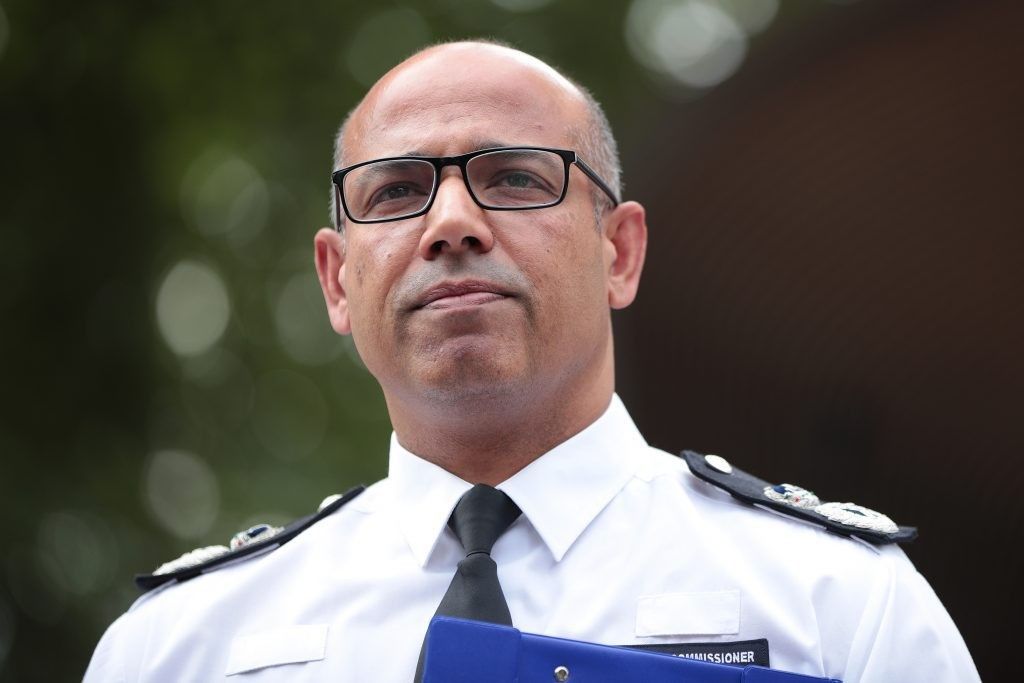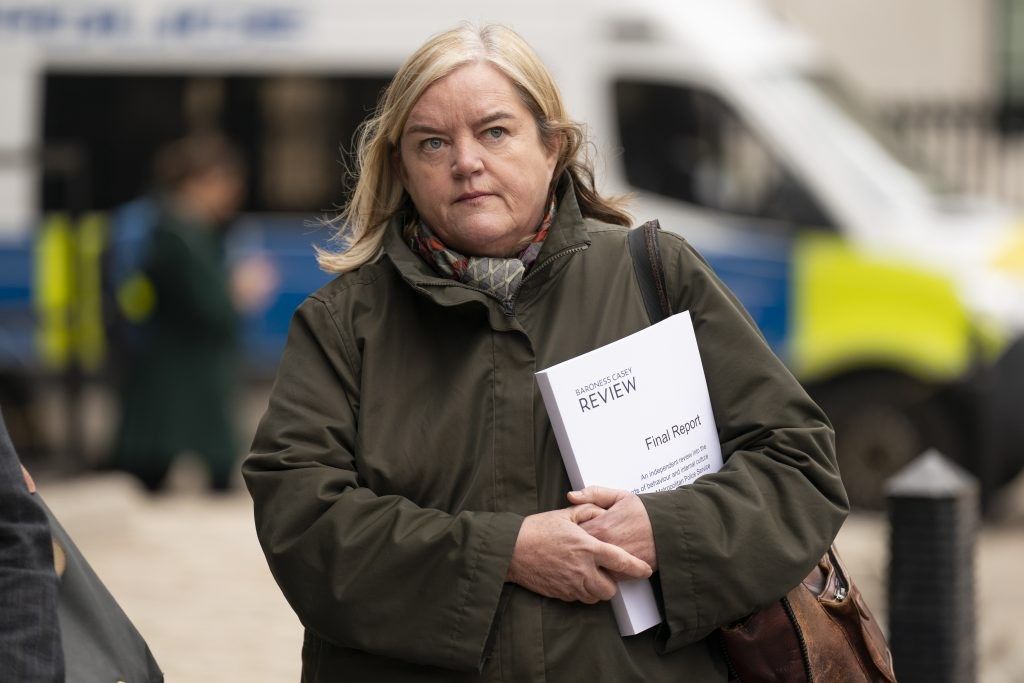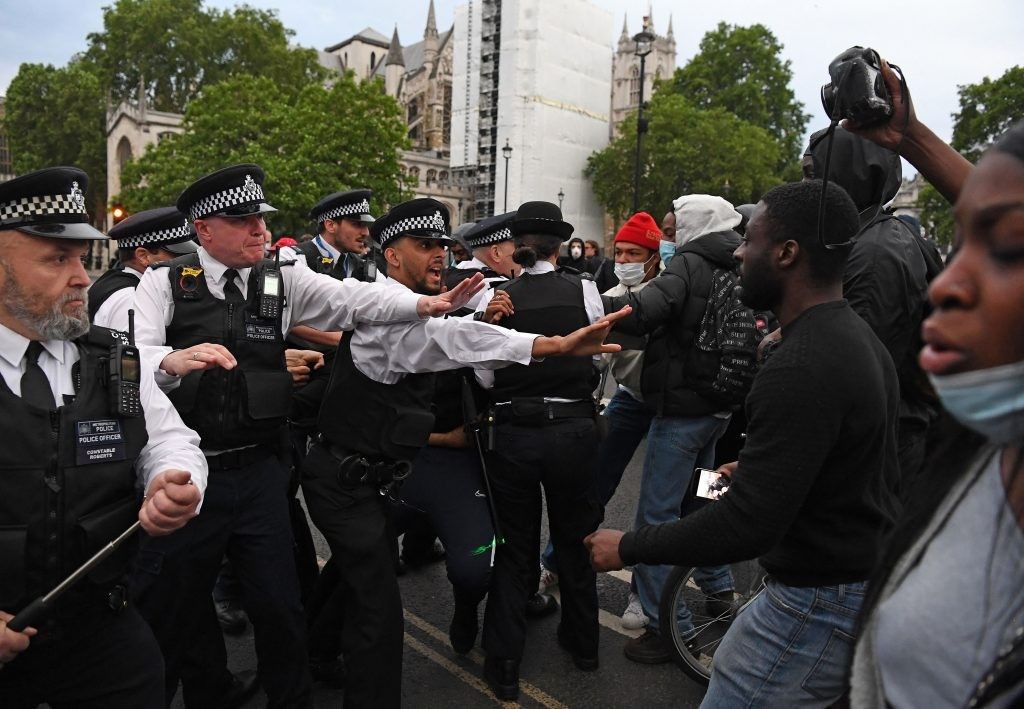THE current crop of Britain’s chief constables cannot be trusted to reverse institutional racism in their forces, according to the country’s former top south Asian cop, and the National Black Police Association [NBPA].
Ex-assistant commissioner, Neil Basu, made his comments during a wide-ranging interview for the Ramniklal Solanki Pioneers Project – a partnership between Eastern Eye’s parent company, Asian Media Group, and the University of Southampton.
Basu spoke to this journalist before this week’s [Tuesday] damning report by Dame Louis Casey.
The review found that 25 years after the Macpherson report, the Metropolitan Police, his old force, remained institutionally racist, but was also institutionally misogynistic and institutionally homophobic.
Basu explained how, in December 2021, he failed to persuade his fellow chief officers that it was time to say sorry and admit the police service was still institutionally racist.
“I spoke to chiefs’ council, and I said it’s taken us two years to put together a race action plan after George Floyd.
“It took us three months to get the violence against women and girls action plan together, launch it and publish it publicly and nationally after Sarah Everard.
“It’s been two years since George Floyd, and we still haven’t done it, but we’re about to publish it.
“So, now is the time to admit we’re institutionally racist, say we’re sorry, and say we’re gonna change, so here’s our action plan for change.
“They refused to do it.
“In January chiefs voted not to do that, and that’s part of the reason why I retired because I don’t trust this generation of chief constables to reverse the problem institutional racism.
“I’m sorry, I just don’t. They decided that they would rather not do that.
“I understand some of the reasons for not doing it, I just don’t agree.”
Massive disappointment
He said that he was “massively” and “hugely disappointed” by the outcome.
“A fellow chief constable argued against me at national chiefs’ council saying we’re not institutionally anything, it was absolute rubbish.
“I got texts from two very senior chiefs in the country, to show you what the counter arguments in the debate was like, to ask me if I was okay?
“I said I’m a 54-year-old head of counterterrorism, I’m absolutely fine, I’ve heard worse, but I am disappointed.
“Actually, they both said to me, ‘Don’t worry, we’re in the room, and we think your argument carried the room.
“‘So, when we all vote in January, when we all write to the president, Martin Hewitt, in January, and I think this will happen.
“Not only did it not carry the day, but it went against me.”

The president of the NBPA, Chief Inspector Andy George, told Eastern Eye exclusively how he attended some chiefs’ council meeting virtually.
He revealed that when talking about racism in the service, several chief officers did not bother to turn on their cameras or microphones during the discussions.
In his opinion this demonstrated their lack of interest in crucial issues affecting ethnic minority communities.
He agreed with Basu that the police chiefs dragged their heels with the race action plan, but they moved quickly when it came to Sarah Everard, a white woman, who had been murdered by a Met officer.
“That’s why the race action plan was described not as a strategy, but as an action plan.
“I would be really supportive of Martin Hewitt, the chair the National Police Chiefs’ Council.
“He’s been quite gutsy in the way that he actually designed the race action plan with the setup of the independent scrutiny and oversight board.
“But again, that’s telling in itself that he thought that we needed an independent scrutiny and oversight board for the race action plan.
“There was none needed for the violence against women and girls’ strategy, and as Neil said, that was business as usual, that was done really quickly.
“That was a response to what the community were telling us, and the reason they can move on violence against women and girls quicker is because of the representation at the top.
“We have about 16 chief constables now that are women, we also then have all of the other male chief constables who have loved ones, mothers, daughters, sisters, that they want to protect as well.
“So, they had a personal and emotional connection to violence against women and girls, which allowed them to move quicker on it.
“Because of the lack of representation from an ethnic minority background, we do not have that same personal emotional connection.
“The whole race issue is an issue that almost needs to be contained, rather than one that needs to be dealt with.”
Community confidence
George also questioned how serious police chiefs were about implementing the action plan.
“We’re losing confidence probably every day.
“We always have more hope than confidence, if I’m honest.
“We’ve worked with policing to try to get this right, and I think that the lived experience of our membership, coupled with the drive and desire from policing to move forward was something that I think could have definitely changed the dial and would have made things better.
“But as things have went on, we just seen it almost being the can being kicked down the road.
“What’s actually happened is that all 43, 44 chiefs in England and Wales and British Transport, Police say they’re signed up to the plan, but some are more signed up than others.
“They’re almost hiding behind this fact that the College of Policing are doing this.
“But at a local level we are not seeing the same engagement, and the same activity.
“We know in some forces, there’s a sergeant that’s actually running this plan in one particular force, and that’s shocking that that burden has been placed on that sergeant to try to change the entire culture of that organisation to deliver the race action plan.
“That in itself tells me that we aren’t going to properly move on this.
“If we can’t even admit that the problems are there, then we face another 20 years of dealing with specific issues that kind of forms part of institutional racism.
“Until you get to the systemic reasons that racism still is present, and particularly thriving in policing at this minute in time, then we’re never going to overcome it.”
Casey report
The Casey report is scathing of the Met.
“Met officers are 82 per cent white and 71 per cent male, and the majority do not live in
the city they police,” it determined.
“As such, the Met does not look like the majority of Londoners.
“Since publication of the Macpherson report in 1999, the Met has remained largely white and largely male.
“If recruitment continues on its current trajectory, it will take at least another 30 years, until 2053, to reach gender balance.
“It will take even longer, until 2061, to reach 46 per cent black, Asian and ethnic minority representation – what is needed to be representative of London today, let alone the even more diverse city it will be in nearly 40 years’ time.”

The report concludes that the Met are missing opportunities to win over the confidence of people of colour.
“The Police Uplift Programme has been a missed opportunity to improve the diversity and skills base of its workforce.
“There is no plan B.
“This isn’t about being ‘woke’ or having politically correct quotas.
“It means the Met is missing out on the talent it desperately needs to improve its effectiveness.
“It is also damaging community confidence, by failing to create a force that looks like the city it polices.
“This is creating a negative spiral in which some communities continue to have negative experiences at the hands of the police, trust them less, and are less likely to join.”
The report found evidence of institutional racism, misogyny and homophobia in the Met.
“There are people in the Met with racist attitudes, and black, Asian and ethnic minority officers and staff are more likely to experience racism, discrimination and bullying at their hands.
“Discrimination is often ignored, and complaints are likely to be turned against black, Asian and ethnic minority officers.
“Many do not think it is worth reporting.
“Black officers are 81 per cent more likely to be in the misconduct system than their white counterparts.
“The organisation has failed to significantly improve the recruitment and retention of black officers at all levels.
“This is particularly true of black and ethnic minority women.”
The Met commissioner, Sir Mark Rowley, repeated his apology to Londoners.
“The appalling examples in this report of discrimination, the letting down of communities and victims, and the strain faced by the frontline, are unacceptable,” he said.
“We have let people down and I repeat the apology I gave in my first weeks to Londoners and our own people in the Met. I am sorry.
“I want us to be anti-racist, anti-misogynist and anti-homophobic.
“In fact, I want us to be anti-discrimination of all kinds.
“There are external factors – funding, governance, growing demand and resource pressures that shouldn’t sit with policing – that the report has identified.
“Baroness Casey is right to identify the impact these have had on our ability to police London, but there can be no excuses for us.
“The core of the problems are [sic] for policing to determinedly confront.”
Racism u-turn
For years, Basu argued against his profession, not just the Met, being labelled as institutionally racist.
But the former head of counter terrorism revealed that his former boss, Dame Cressida Dick, pointed out that he had performed a u-turn in later years.
“I’ve been speaking about institutional racism since 1998, but nobody listened.
“What changed was I became very important as I got promoted.
“I was probably the third loudest voice in policing behind the commissioner and the director-general of the National Crime Agency.
“I did want to believe that policing was no longer institutionally racist.
“A lot of my critics who said I’d done a u-turn, they’re right.
“I said, I don’t think we’re institutionally racist, full of racist and misogynists and homophobes.
“I can be defensive, because I’m not a chief constable anymore, no chief constable can say this, but it’s a tiny minority.
“It is not what it was like in 60s 70s and 80s, policing has massively improved.
“There are still these monsters in our midst that we shouldn’t have let in, that we should have spotted, that we should have fired, but it’s a much smaller proportion of our workforce.
“We’d done some great things, so I was prepared to say, we’re not anymore.
“But the trouble is, and I started looking at this a lot from 2012 onwards, I did a diversity health check with the Metropolitan Police where I looked at all our facts and figures and said we’re still looking like were totally disproportionate in the way we police, the way we use force when we stop and search.”
Things changed with George Floyd, the black American whose murder by a white police officer was captured on film.

A judge jailed former police officer, Derek Chauvin, to more than 22 years, after he knelt on Mr Floyd’s neck for more than nine minutes during his arrest.
Basu revealed that a black, female officer “shamed” and “embarrassed” him into writing to his Metropolitan Police colleagues about the impact of the killing among ethnic minority officers.
He wrote an internal blog which was immediately leaked to the Daily Mail, so Basu sent it to The Guardian, which printed it in full.
“Very few chief constables said anything publicly about what was going on, and ever since that day I have been inundated with offers to speak and mentor.
“So, I’ve listened to black and brown and female voices all up and down the country.
“I already knew that communities felt we were institutionally racist, but black and brown voices in your own professional are telling you that they still feel exactly the same way as they felt, it’s impossible to ignore.
“What’s very different from 1992, when I joined the police is that that 100 per cent of the black brown and female officers and staff all had their own personal horror story.
“Now that’s not true, it’s probably about 50 per cent, but that’s still great progress, but still not good enough.
“When I heard all that, I had to do a u-turn.
“I had to say, listen to the voices and listen to the community, look at our facts and figures, we are still exactly what Macpherson accused us of.”
Scared police chiefs
Basu said he took his concerns to the police chiefs’ council in December 2021, urging them to say sorry, which they refused to do.
That rejection was one of the reasons he left policing.
He said some colleagues tried to persuade him to stay and influence change from within.
But the officer, who reached the rank of chief constable, said he realised he was no longer making a difference in shifting the debate or position on racism in the service.
Basu told the Pioneers Project that some chief constables were too scared to admit they had a problem with racism.
“I reckon a third of chief constables in the country get it and will publicly vote for saying we are sorry, we need to do something about it.
“I think the third believe that but are too scared to say it because they worry about their workforce backlash.
“They worry about communities using it against them and saying, I told you, you’re even admitting you’re racist, instead of actually saying, finally, you’ve admitted it.
“But I think the other third don’t care about this, and I find that as a professional cop for 30 years difficult to deal with.”
Policing loss
George described Basu’s leaving as a great loss to policing, and he said ethnic minority communities had lost faith that anything would change.
“Neil Basu was for us a shining light, he was an outstanding officer.
“Towards the end of his career he definitely spoke up more about race issues, and he knew what the consequence of that was, which is why I will have respect for him.
“The reason we’re talking about him is because he got to that level in the Met.
“But whenever he actually spoke up, he knew that it was going to cost them potentially the Met job, he knew it would cost him any other job, because of the way things sat.
“So, whenever he called for positive discrimination to be utilised to increase the representation of policing, he knew that that was going to cost him his role.
“For me, it’s been a really big loss because the fact that we would have a person of colour as the most senior police officer in the UK would have been a real saying that things had moved forward.”
Chief Constable Gavin Stephens is the senior officer responsible for the police race action plan.
“Policing is more inclusive, more diverse, and more reflective of our communities than we have ever been but equally it still contains racism, discrimination and bias,” he told Eastern Eye in a statement.
“The police race action plan, at its core, is about good policing and reflecting and protecting all communities.
“We have worked hard to ensure we’re listening to those with lived experience inside and outside policing and we are making progress against the plan.
“The Independent Scrutiny and Oversight Board has played a critical role in helping us to shape the plan, and we will continue to work to improve how we listen, understand, and address the concerns of black people, both within and the community.”
Basu also revealed that although others tried to persuade him to apply for the Met commissioner’s job when his friend and mentor, Cressida Dick, resigned, he never wanted the job.
“Not only can I not do anymore, but it made no difference.
“On December the 16th 2021, I realised it made no difference.
“I would have only applied for it [commissioner’s job] and taken it if my number one priority would have been professional standards and improving the diversity of the Met as a bellwether sign to the rest of the chiefs in the country that the Met is taking this seriously, so you’d better take it seriously too.
“If I wanted to do that job, risk my mental health, risk my physical health, to take on the world’s most pressured policing job.
“And of course, with this political administration, do you think I would have even passed the interview if I had said that?”
